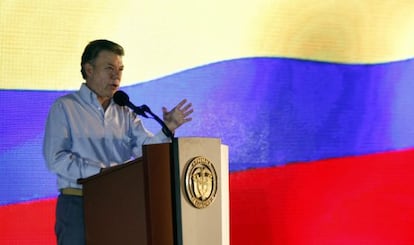Santos proposes law to eliminate presidential re-elections in Colombia
The Colombian leader says the bill will “reestablish balance of power” in the country

Colombian President Juan Manuel Santos has kept the promise he made on Congress’ first day of business by calling for a reform bill that would eliminate the 2005 law that paved the way for the reelection of then-president Álvaro Uribe. Congress will discuss the bill during eight scheduled debates. The measure will also prohibit all high-level officials from running for two terms back-to-back.
“Breaking down this door to reelection is the way to reestablish balance of power in our country,” Santos said as he announced the bill in Casa de Nariño in Bogotá. The parties within the president's coalition, some members of the opposition and independents negotiated on the final proposal, Santos said.
The president told the crowd that his last electoral campaign confirmed his “personal and political conviction” that the law “is not appropriate and that is why we must repeal it.” The incumbent, who was elected for the second time last June, defeated Uribe’s ally, Oscar Iván Zuluaga, in the run-off.
During the campaign, Santos had said he would replace the current law with a new measure that would extend the terms of office for the president and high-level elected officials, such as mayors and governors, to five or six years. On Wednesday, however, he said he had set aside that possibility after discussions with various parties and, together, they reached the conclusion that it would be better to keep the four-year terms.
The president told the crowd that his last electoral campaign confirmed the law “is not appropriate”
The bill also plans to change the way in which the nation’s Prosecutor General is appointed. The current process calls for the High Courts to create a shortlist of candidates. Congress then examines them and makes the final selection. If Santos' proposal were to pass, the president would send the Senate a shortlist of candidates from whom to choose. Various lawmakers immediately criticized the plan, saying that the Prosecutor General would then be in “his pocket.”
The measure also calls for modifying the way in which senators are chosen to give greater representation to regions that do not have any seats in that house. Right now, 14 of the 32 departments do not have a political representative in the upper house. "Electoral districts with less than 500,000 residents will elect some senators; the rest will be chosen through national elections," the bill says. This measure will give greater participation to the areas most heavily hit by the armed conflict - a step that shows the president is thinking about what the future will bring if the government signs the peace agreement with the Revolutionary Armed Forces of Colombia (FARC).
The law would also grant the loser of the presidential race a seat in Congress.
The bill also plans to change the way in which the nation’s Prosecutor General is appointed.
The Santos administration wants to abolish preferential voting where citizens choose a candidate from a list of options. Santos wants to strengthen the parties by asking voters choose a party instead of a single contender. "We have to abolish the open-list model for public office elections. The stronger the parties - this is like a golden rule of democracy - the stronger democracy," Santos said.
Though the government negotiated some parts of the bill with its allies in the National Unity coalition, the proposal will still go through a number of debates in Congress where Uribe's Democratic Center Party, the Green Alliance, and the leftist Polo Democrático party will present their own initiatives.
Translation: Dyane Jean François







































